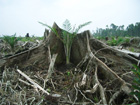 If Cargill’s PR stunt a few months ago left you feeling confused about the company’s role in driving deforestation and potential orangutan extinction in Indonesia, you might find it helpful to know that a couple of recent articles expose the truth. A recent Indonesia Finance Today article clarifies that Cargill plans to expand its plantation land in Indonesia to 90,000 hectares in April 2013 and that while the company’s crude palm oil production (CPO) in Indonesia is currently at 300,000 tons, it’s targeting to reach one million tons.
If Cargill’s PR stunt a few months ago left you feeling confused about the company’s role in driving deforestation and potential orangutan extinction in Indonesia, you might find it helpful to know that a couple of recent articles expose the truth. A recent Indonesia Finance Today article clarifies that Cargill plans to expand its plantation land in Indonesia to 90,000 hectares in April 2013 and that while the company’s crude palm oil production (CPO) in Indonesia is currently at 300,000 tons, it’s targeting to reach one million tons.
This is an interesting turn of events. In response to Rainforest Action Network, Cargill aggressively argued in a public statement that it “does not import Indonesian palm oil to the United States” in an attempt to minimize its role as one of the largest palm oil traders in the world and evade responsibility for the Indonesia deforestation crisis.
As we’ve noted before, however, this is pure obfuscation. By Cargill’s own estimate, nearly 90 percent of the world’s palm oil is sourced from Indonesia and Malaysia, and the company traffics a quarter of the world’s palm oil. Cargill’s claim that it does not ship any Indonesian palm oil into the U.S. is misleading and insincere, as a percentage of Indonesia’s palm oil is refined in Malaysia before being shipped to the US. And regardless of its role in the US market, American based Cargill plays a central role in the global palm oil market that is rooted in Indonesia.
Rapidly expanding palm oil plantations have already spread into millions of acres of rainforests and threaten millions more, making palm oil a leading cause of deforestation and habitat destruction that threatens the very survival of iconic endangered species like the Sumatran tiger and wild Sumatra and Borneo Orangutans. With more than five acres of Indonesia’s rainforest lost every minute, this country has one of the highest deforestation rates in the world.
Despite Cargill’s attempt to skirt the ecological crisis that drives company profits, recent coverage of their plans to expand operations in Indonesia has rendered their PR efforts unsuccessful. In the Jakarta Post Executive Column, chief executive officer of the Singapore-based Cargill Tropical Palm Holdings Pte Ltd admits to Cargill’s “commitment to grow in Indonesia and leverage the country as a base to better serve our customers in Asia and globally through exports [that] underlie our investments in Indonesia. There is great potential for industry expansion, especially given the Indonesian government’s recognition and support for the importance of sustainability in trade and economic growth.”
If Cargill is indeed committed to sustainability, as its latest corporate sustainability statement suggests, expansion is not consistent with that promise. Cargill’s current sustainability commitments related to palm oil are insufficient when compared to the scale of destruction the company drives.
Last month Cargill admitted to doing business with dodgy plantation athat illegally cleared thousands of acres of orangutan habitat in Borneo. According to interviews, the same company allegedly hired people to hunt down and kill orangutans.
The only way Cargill can guarantee it is not contributing to the devastation underway in Indonesia is if it adopts explicit environmental, social and transparency safeguards to prevent it. A commitment to truly protecting rainforests does not start in 2020 or 2015; Cargill’s commitment needs to start now and should not include unchecked expansion.


